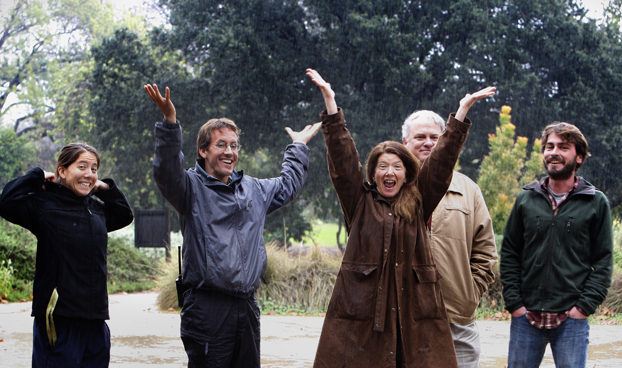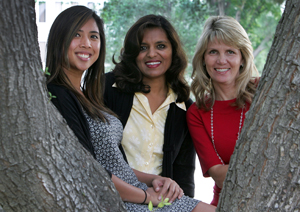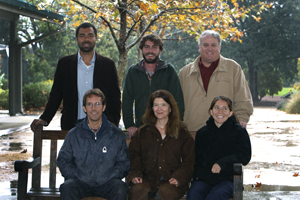 Caption: The U-ACRE project team includes, from left: Valerie Acevedo, Chris Barnhill, Sara Johnson, Greg Dyment and Jonathan Davis at the Fullerton Arboretum. Photo: Karen Tapia Download photo
Caption: The U-ACRE project team includes, from left: Valerie Acevedo, Chris Barnhill, Sara Johnson, Greg Dyment and Jonathan Davis at the Fullerton Arboretum. Photo: Karen Tapia Download photo
University Initiative: Health Care
USDA Grants Target Obesity, Nutrition
First-Ever Funding Means $800,000 for Research, Programs
In a first for Cal State Fullerton, the U.S. Department of Agriculture has awarded funding to the university — more than $800,000 in grants for projects tackling obesity and promoting good nutrition and related research.
As a newly-designated Hispanic-Serving Agricultural University on the Federal Register, CSUF garnered three USDA grants:
 Caption: The team working on the childhood obesity project includes, from left Lyanna Pillazar, Archana J. McEligot and Laura Chandler. Photo: Karen Tapia Download Photo
Caption: The team working on the childhood obesity project includes, from left Lyanna Pillazar, Archana J. McEligot and Laura Chandler. Photo: Karen Tapia Download Photo
- $280,343 for “A Childhood Obesity and Nutrition Curriculum for a Diverse and Changing Population,” directed by Archana J. McEligot, associate professor of health science;
- $277,500 for “Urban-Agriculture Community-Based Research Experience,” directed by Sara E. Johnson, associate professor of anthropology; and
- $245,902 for “Increasing Workforce Diversity: Training Hispanic Students to Address Childhood Obesity and Nutrition,” directed by McEligot and Erualdo R. González, assistant professor of Chicana and Chicano studies.
“These grants mark a new chapter for our institution,” said Jeannie Kim-Han, campus director of research development. “The USDA recognizes Cal State Fullerton's commitment to obesity abatement and stellar education of a diverse-student population. The grants will enhance health education and research as they relate to obesity prevention, and benefit faculty members, students and the community.”
According to first lady Michelle Obama, “the physical and emotional health of an entire generation and the economic health and security of our nation are at stake.”
Childhood obesity rates in America have more than doubled over the past 30 years, according to the U.S. Centers for Disease Control and Prevention. Being overweight or obese increases the risk of myriad diseases and health conditions, including hypertension, diabetes, heart disease, stroke, gallbladder disease, osteoarthritis, sleep apnea, respiratory problems, endometrial and breast and colon cancer.
The three USDA-funded programs each address the situation in different ways.
An Obesity and Nutrition Curriculum for a Changing Population
McEligot is working with Francene M. Steinberg, chair and professor of nutrition at UC Davis, on the “Childhood Obesity and Nutrition Curriculum” project, which aims to train CSUF’s diverse student population to address the obesity epidemic among immigrant children, who are mainly Southeast Asian, Pacific Islander and Latino. More than 80 undergraduate health science majors of diverse backgrounds are taking part in a trio of courses that consist of a nutrition class this semester, a new course to be offered in the fall and an internship in spring 2013, McEligot said.
The new class is being developed in collaboration with UC Davis. In it, “students will be trained via a comprehensive approach to tackle childhood obesity,” McEligot said, adding that the course will include an intensive training session conducted by UC Davis professors, and internships at community agencies and at UC Davis.
“Students will learn the basic biological processes related to childhood obesity, and how to reduce the epidemic by exploring critical factors — such as culture, economics and psychosocial issues and physical interventions — related to childhood obesity in our changing world.”
The CSUF team working on the project includes Laura Chandler, lecturer in health science who is recruiting students and providing advisement; Jie W. Weiss, associate professor of health science; Debra L. Patterson, associate professor of kinesiology; and Tu-Uyen Nguyen, assistant professor of Asian-American studies. The team, McEligot said, is helping create the new course. In addition, public health graduate student Lyanna Pillazar is serving as the grant activity coordinator.
“The students will have the opportunity to engage in a focused study on childhood obesity and nutrition, interact with the faculty at UC Davis, learn about higher education and career opportunities in nutrition and gain valuable skills via experiential/internship training in the childhood obesity and nutrition field,” McEligot said.
Urban-Agriculture Community-Based Research Experience
 Caption: Back row, from left: Joel K. Abraham, Jonathan Davis and Greg Dyment; front row, from left: Chris Barnhill, Sara Johnson and Valerie Acevedo. Photo: Karen Tapia Download photo
Caption: Back row, from left: Joel K. Abraham, Jonathan Davis and Greg Dyment; front row, from left: Chris Barnhill, Sara Johnson and Valerie Acevedo. Photo: Karen Tapia Download photo
The U-ACRE project is a hands-on, community-based research experience for 10 undergraduates and one graduate student.
The students will be paired with faculty members, guide the students in research projects and serve as mentors, including Johnson; Joel K. Abraham, assistant professor of biological science; William J. Hoese, associate professor of biological science; Melanie A. Sacco, assistant professor of biological science; Darren R. Sandquist, professor of biological science; and Jochen H. Schenk, associate professor of biological science.
Each participating undergraduate will receive a $2,000 stipend and the graduate student will receive a $20,000 scholarship per year for two years. Those interested in applying for the program have until March 1. More information is available at http://hss.fullerton.edu/envstud.
The two-year research experience, Johnson said, will begin this summer with a five-week intensive course covering the natural, social and economic environments. In the fall, the students will participate in community research with their mentors.
The students “are not just going to start research projects; they are going to work on established projects in the community, where they will be able to make a difference.”
Those projects include:
- The training garden at the Fullerton Arboretum, which was created by Greg Dyment, Arboretum director, and staffers Chris Barnhill and Jonathan Davis complements classroom instruction. Dyment, Davis and Barnhill guide students through the process of planting, growing the food and teaching others to do so. Food grown at the Arboretum is available at the Arboretum Farm Stand and it also is donated to local food banks and homeless shelters.
- The waste diversion program at Ladera Vista Junior High in Fullerton, where students learn the process of recycling and teach what they learn to the junior high students and their families. Johnson established the program last year.
- The urban garden program, also created by Johnson, at the Fullerton Interfaith Emergency Service headquarters, which provides food and housing for the homeless. Since 2006, Johnson’s students have worked in the garden, teaching residents about good nutrition and how to grow their own vegetables and make healthy choices.
“Students will continue to learn valuable skills that are critically needed,” Johnson said, adding that students contribute to and benefit from the community projects.
In their second year of U-ACRE, the experience will culminate with attendance at conferences and thesis submissions. For more information, contact Johnson at sjohnson@fullerton.edu.
Training Hispanic Students to Address Childhood Obesity and Nutrition
The “Increasing Workforce Diversity” project aims to train 40 Latino students over the next two years to become leaders who understand how policy affects nutrition and childhood obesity in Latino communities, McEligot said.
McEligot said she and González are partnering with Latino Health Access and the USDA's Hispanic-Serving Institution Division to train students on increasing understanding of the broader ecological and social determinants related to childhood obesity and nutrition. The goal is to produce more effective leaders to tackle the epidemic in Latino communities.
One Latino student will receive a $10,000 scholarship per year for two years for tuition and other education-related expenses while he or she earns a CSUF degree. The other 39 students will receive scholarships to complete internships and/or present their research at conferences.
“This grant primarily focuses on developing Hispanic leaders in nutrition and public policy, and will educate students on how to reduce childhood obesity and nutrition in Hispanic communities through not only individual, but, more importantly, through structural interventions,” McEligot said.
As part of the grant, she and González are creating a new track in the health science program emphasizing childhood obesity prevention and nutrition and focusing on health policy and the urban environment. The 40 students will take the new course and participate in leadership workshops.
Eventually, “we expect those who participate will be well-positioned to compete for USDA jobs and be prepared to take on leadership roles in the health-nutrition policy-making arena,” McEligot said.
“Students will be connected with the Latino community through internships, where they will work on childhood obesity and nutrition education issues,” she said.
For more information, contact McEligot at amceligot@fullerton.edu.
Feb. 3, 2011
